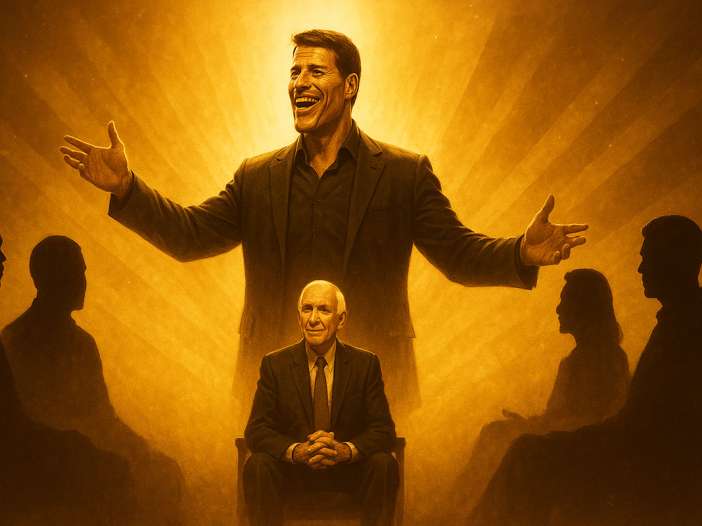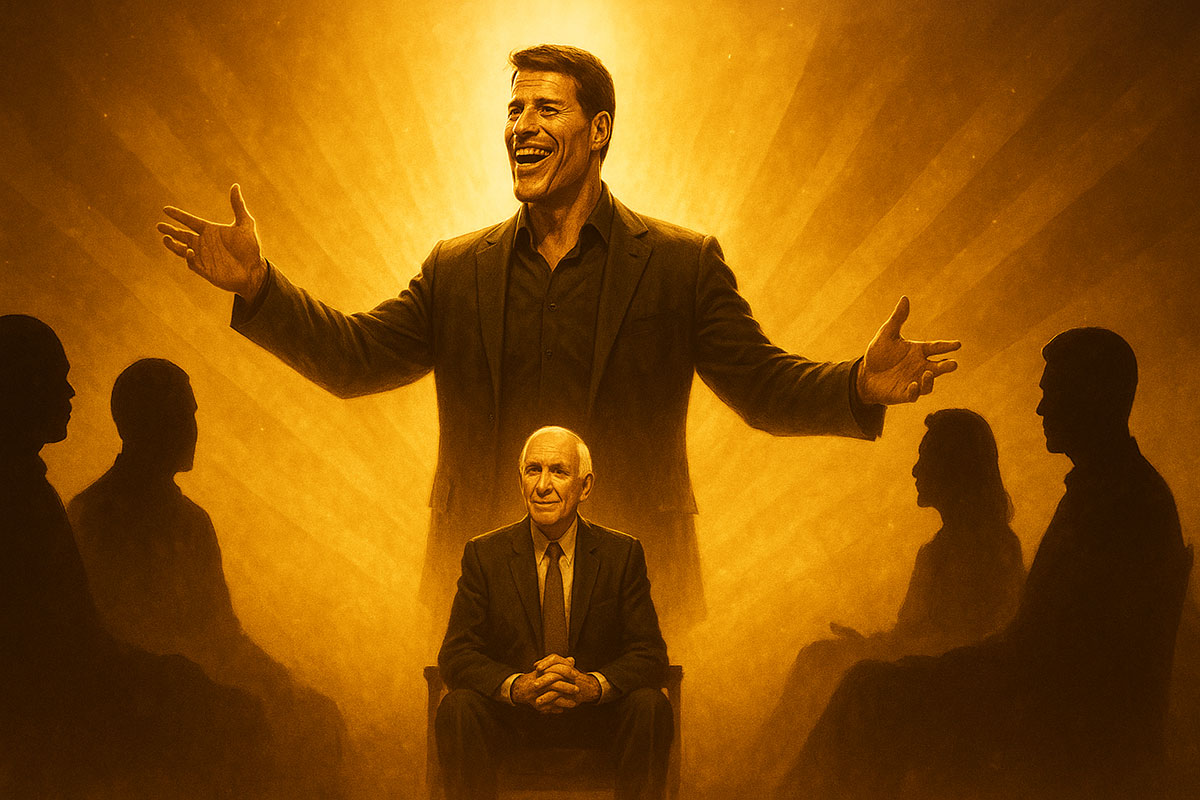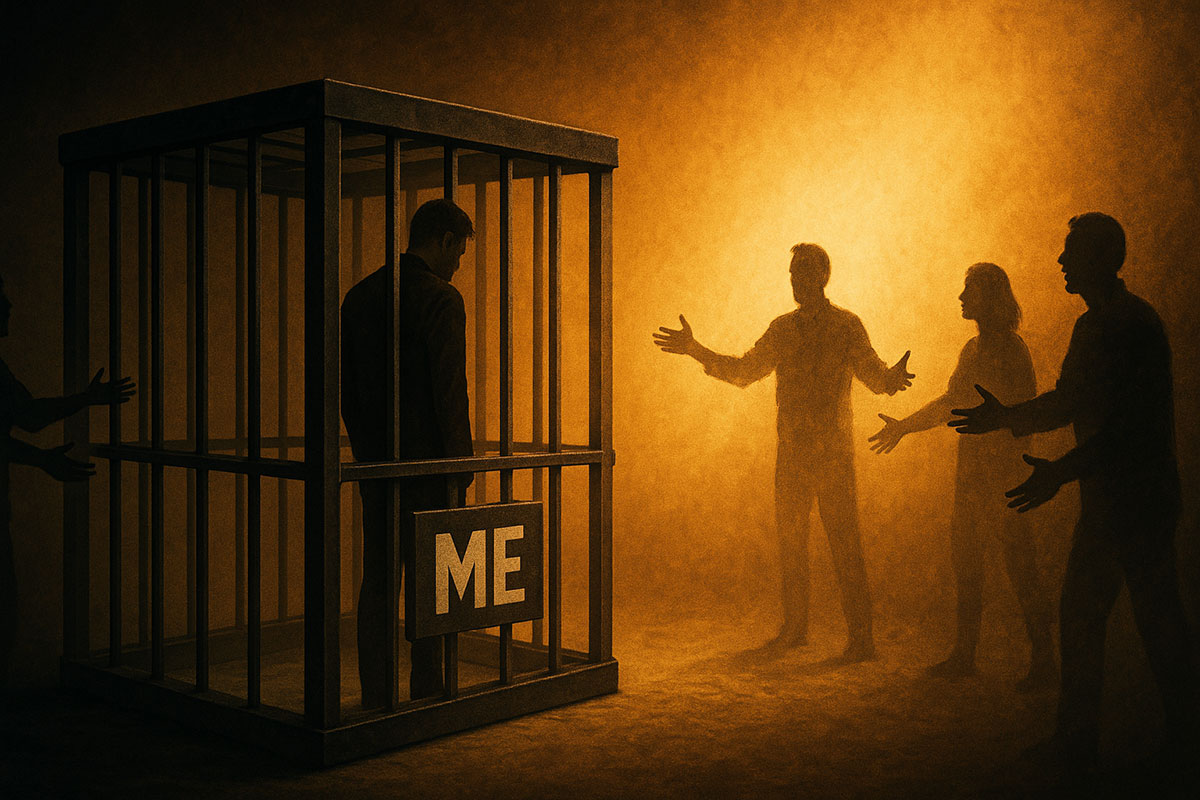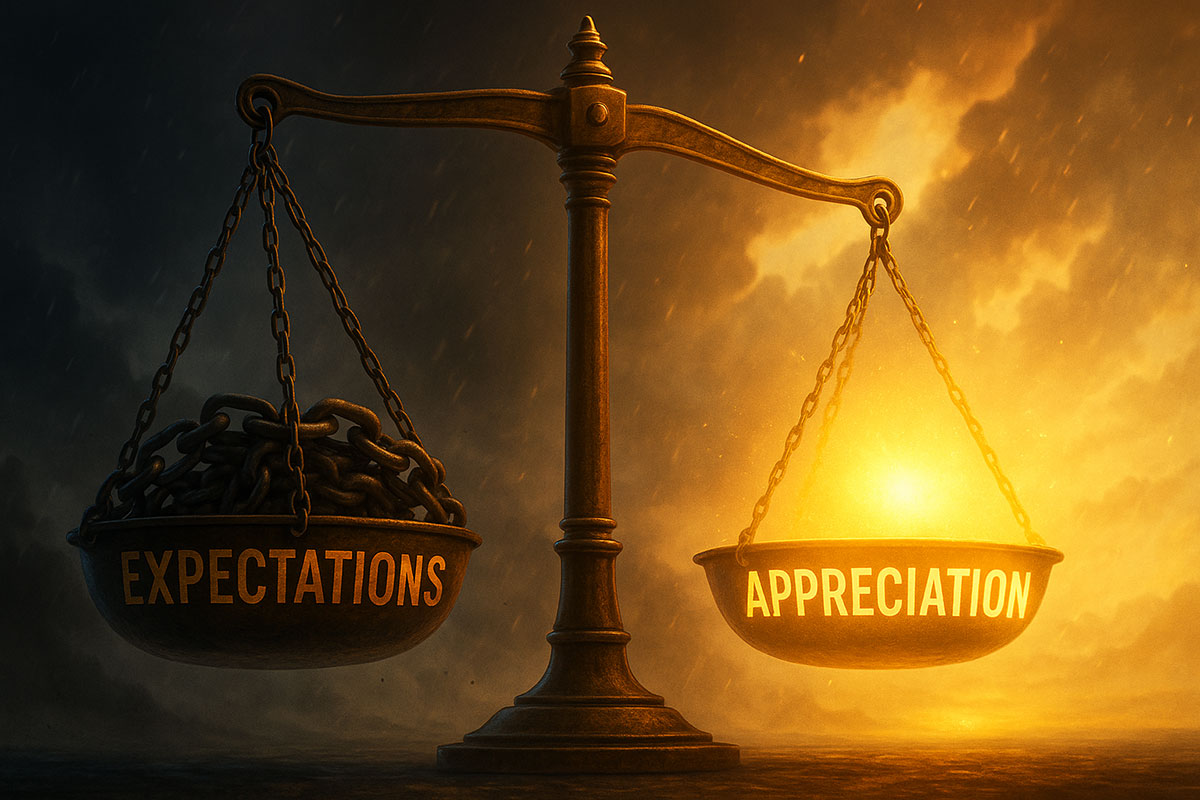
|
Getting your Trinity Audio player ready...
|

Introduction by Tony Robbins
When I look at the world today, I see so many people suffering — not because life has denied them opportunity, but because of where their focus is. Human beings are meaning-making machines. We can take the same experience and either turn it into suffering or into strength. The difference isn’t the event; the difference is the meaning we attach to it.
That’s why we’ve come together here. This is not just a conversation about ideas; it’s about transformation. You’ll hear from some of the greatest voices in personal growth — men and women who’ve spent their lives helping others rise above pain, live with gratitude, trade expectations for appreciation, and choose joy no matter the circumstance.
And guiding us through it all is my mentor and dear friend, Jim Rohn. Jim taught me that success is not something we chase; it’s something we attract by the person we become. Tonight, we’re going to explore how to become the kind of person who can end suffering and experience real fulfillment — starting right now, in this very moment.
So let’s dive in.
(Note: This is an imaginary conversation, a creative exploration of an idea, and not a real speech or event)

Topic 1: The Trap of Self-Focus

Jim Rohn (Moderator):
We begin today with a question at the root of Tony’s teaching: why does focusing too much on ourselves bring suffering? Most people think the opposite — that if they could just get more for themselves, they’d be happy. So why is it, gentlemen and ladies, that self-focus so often turns into misery?
Tony Robbins:
Because the mind, when focused inward, becomes a problem-solving machine aimed at “what’s wrong.” When you’re obsessed with yourself — your pain, your needs, your fears — the brain magnifies it. Contribution is the cure. The moment you shift from “How do I feel?” to “How can I serve?” the suffering breaks.
Mel Robbins:
I’ll add: when you’re stuck in your own head, you’re trapped in hesitation. That’s where anxiety grows. The fastest way out is action that involves others. Pick up the phone, thank someone, compliment a stranger. You shift from “me” to “we,” and your state transforms.
Les Brown:
Yes, because service enlarges you. Self-focus shrinks you. I grew up poor, unwanted, labeled “educable mentally retarded.” If I had stayed stuck on myself, I’d have drowned in pity. But when I realized my story could help someone else, suddenly my suffering became fuel.
Brian Tracy:
From a productivity perspective, self-focus leads to paralysis. You overanalyze, you worry about appearances, you compare yourself to others. High achievers focus on goals beyond themselves — missions, customers, communities. The greater the external purpose, the less room there is for suffering.
Eric Thomas (ET):
Listen, I was homeless once. Slept in abandoned buildings. When I focused on me, all I saw was pain. But when I started tutoring kids who were struggling, I forgot my own problems. Self-focus is small. Purpose is big. That’s the difference.
Jim Rohn (Moderator):
Beautiful. So if self-focus is the trap, let me ask: how does one break out of it in daily life? It’s easy to say, “Serve others,” but what’s the practical doorway for someone stuck in their own head right now?
Mel Robbins:
Start tiny. I call it the “5 Second Rule.” When you notice you’re spiraling inward — overthinking, worrying — count backwards 5-4-3-2-1, and take a small action outward. Send a thank-you text. Smile at someone. Micro-actions of connection break the loop.
Eric Thomas:
And you’ve got to change your circle. If you’re hanging with people who only talk about themselves, you’ll drown. Get around people with big dreams, people who serve. Their energy will pull you out of your own pity party.
Les Brown:
Also, speak words of life. What comes out of your mouth steers your heart. Say: “I’m grateful. I’m capable. I can make a difference.” Affirmations shift your state from victim to victor.
Tony Robbins:
And condition it daily. Don’t wait for life to fix itself. Each morning, I do a “priming” routine — breathing, moving, focusing on gratitude, on the people I love, on who I can serve today. That creates a habit of looking outward. If you don’t condition your focus, the mind defaults to suffering.
Brian Tracy:
Exactly. Discipline is freedom. Write down your goals each day — but make sure they include something for others. A note of appreciation to your spouse, a promise to help your team, a customer you want to delight. That way, your focus is never just self-centered.
Jim Rohn (Moderator):
Excellent. Now one more question: what’s the deeper payoff of breaking the trap of self-focus? In other words, if someone consistently trades self-absorption for contribution, what kind of life opens up?
Les Brown:
You live a larger life. You stop just surviving and start inspiring. People are hungry for hope, and when you feed them, you feel alive. Legacy is built not by what you get, but by what you give.
Brian Tracy:
It creates confidence. When your attention is on helping others, you’re less self-conscious. Fear evaporates. You become decisive, bold, and respected, because your motives are clear.
Tony Robbins:
And joy. Nothing compares. The paradox of life is that the more you give, the more you feel full. The more you make it about others, the more abundant your own life becomes. That’s why appreciation and contribution are the twin keys out of suffering.
Eric Thomas:
And you set fire to your potential. Look — when I stopped thinking, “Why me?” and started asking, “Why not them?” I discovered energy I didn’t know I had. That’s what wakes you up at 3:00 a.m. excited instead of defeated.
Mel Robbins:
And let’s be real: you’ll still stumble, you’ll still feel fear. But if you’ve trained yourself to look outward, to act, to serve — then even those setbacks feel different. You don’t suffer long, because your life isn’t about just you anymore.
Jim Rohn (Moderator):
So there it is. Self-focus shrinks the spirit. Service enlarges it. The trap is real, but so is the way out. It starts with awareness, shifts through small acts, and pays off in confidence, joy, and legacy. As I often say, “We get paid for bringing value to the marketplace.” And the marketplace of life is other people.
Topic 2: The Nature of Suffering

Jim Rohn (Moderator):
Gentlemen, in our first conversation we explored self-focus as a source of pain. Today, let’s widen the lens: what is suffering itself? Why do human beings carry it so heavily? I’ll start with you, Robin.
Robin Sharma:
Suffering, Jim, is often self-created. We resist what is, clinging to what should be. My mentor once told me, “The moment you argue with reality, you lose, but only 100% of the time.” Growth requires pain — but suffering is optional. It’s the mind’s story about pain that chains us.
Tony Robbins:
Exactly. Pain is part of life. Suffering is when we add meaning like, “This shouldn’t have happened,” or “I’m not enough.” Pain can drive us; suffering paralyzes us. Change your story, and you can turn suffering into strength.
Wayne Dyer:
Yes, Tony, and I’d add this: suffering begins with attachment. We suffer because we demand life to fit our expectations. When we learn to let go, to trust, to flow, suffering fades into acceptance.
Zig Ziglar:
Now let me put it in plain language. You can’t go through life without getting knocked down. But you don’t have to stay down. I’ve seen folks with nothing who smile more than millionaires. Why? They don’t confuse circumstance with destiny.
Ed Mylett:
I’ll take a different angle. Suffering is also a teacher. My father battled addiction, and I thought that pain was unfair. But that suffering shaped my hunger to grow, to become strong for my family. Sometimes God uses suffering to sharpen our edge.
Jim Rohn (Moderator):
That’s powerful. So if suffering is part story, part attachment, part teacher, here’s the practical question: how do we transform it? How does a man or woman stuck in deep suffering begin to shift it into strength?
Zig Ziglar:
Gratitude, Jim. Start with one thing you’re thankful for. You can’t be bitter and grateful at the same time. If you focus on blessings, suffering loosens its grip.
Wayne Dyer:
And silence. Take time each day to be still. Most suffering is noise — endless thoughts. When you return to the present moment, suffering dissolves like fog in sunlight.
Tony Robbins:
Action is key. Motion creates emotion. If you feel trapped, do something physical. Change your physiology, break the pattern. Then reframe the meaning: ask, “How is this happening for me, not to me?” That question turns suffering into empowerment.
Ed Mylett:
And build capacity. Suffering shrinks when your capacity expands. Go to the gym of the mind and soul: prayer, discipline, mentorship. The stronger you get, the smaller the suffering feels compared to who you’re becoming.
Robin Sharma:
And serve. The fastest way out of suffering is to help someone else. Even if it’s just a smile or a kind word, you realize your suffering is not the whole story — and that perspective heals.
Jim Rohn (Moderator):
Good. Now for the final question: what is the ultimate reward of transforming suffering? If we can accept it, reframe it, and grow through it, what kind of life opens up on the other side?
Wayne Dyer:
Freedom. When suffering no longer enslaves you, you’re free to live from your highest self. You stop reacting to life and start creating it.
Ed Mylett:
Confidence. When you’ve suffered and survived, you carry a certainty: “If I handled that, I can handle anything.” That confidence is unshakable.
Robin Sharma:
Greatness. Every hero’s journey is written in suffering. Without it, there is no depth, no leadership. On the other side, you become a light for others.
Tony Robbins:
Joy. Because the contrast of suffering makes joy meaningful. When you’ve suffered, you appreciate love, laughter, freedom more deeply. Transformation isn’t about eliminating suffering, but about discovering joy in spite of it.
Zig Ziglar:
And let’s not forget humor. Life’s too short to take suffering too seriously. When you learn to laugh through tears, you become unstoppable. As I like to say, “If you can dream it, you can achieve it” — even if you cried on the way there.
Jim Rohn (Moderator):
So there we have it. Suffering is universal, but it need not define us. It’s a signal, a teacher, a doorway. Gratitude, service, acceptance, action — these turn suffering into strength. And the reward? Freedom, confidence, joy, even laughter. Gentlemen, that’s a lesson worth carrying.
Topic 3: The Power of Appreciation

Jim Rohn (Moderator):
Gentlemen, lady — we’ve talked about self-focus and suffering. Now let’s turn to something that can dissolve suffering in an instant: appreciation. Why does appreciation hold such extraordinary power in a human life?
Jack Canfield:
Because appreciation changes your focus. Most people look at what’s missing, what’s wrong, what’s not enough. Appreciation flips the switch. You begin to see what’s already good, what’s already working. And that simple shift transforms how you feel, which transforms what you do.
Tony Robbins:
Yes. You cannot be angry, fearful, or suffering while being truly grateful. Appreciation is the fastest way to shift state. It pulls you out of scarcity into abundance, out of “me” into connection. It’s a universal antidote.
Rhonda Byrne:
That’s why I made gratitude the core of The Secret. What you appreciate, you attract more of. When you feel appreciation, you’re in alignment with life’s abundance. It’s not just emotional — it’s magnetic.
John Maxwell:
And appreciation builds relationships. Leadership rises or falls on the ability to value people. When you genuinely appreciate others, you give them dignity. And when people feel valued, they rise higher.
Bob Proctor:
I’ll put it in prosperity terms. Gratitude raises your vibration. When you appreciate, you’re open. That openness allows ideas, opportunities, and wealth to flow. Without appreciation, you’re closed — and nothing gets in.
Jim Rohn (Moderator):
That’s clear: appreciation changes focus, relationships, even energy. But let me ask you practically: how does a person cultivate appreciation? For someone stuck in stress or lack, what’s the doorway into real gratitude?
Tony Robbins:
Condition it. Don’t wait for gratitude to appear; train it. Each morning, I do three minutes of pure gratitude — feeling it in my body, breathing it. Gratitude is like a muscle: the more you use it, the stronger it gets.
Bob Proctor:
Write it. Every day, jot down ten things you’re grateful for. Put it on paper, let it sink into your subconscious. Writing imprints gratitude deeper than thinking.
Rhonda Byrne:
And speak it. Say “thank you” as often as possible — to life, to the air, to the people around you. Make it a habit, and you’ll notice your entire frequency change.
John Maxwell:
Practice it with people. Don’t just feel grateful — express it. Write notes of appreciation, give sincere compliments, thank your team, your family, your friends. Appreciation unspoken is appreciation wasted.
Jack Canfield:
And recall it. At night, review your day and pick three moments you appreciate. Even if the day was rough, you’ll find them. That rewires your brain to search for good instead of lack.
Jim Rohn (Moderator):
Wonderful. Let’s finish with this: what is the deeper reward of living a life of appreciation? Beyond feeling good in the moment, what does it create over time?
John Maxwell:
It creates influence. People want to follow leaders who appreciate them. A life of gratitude attracts trust and loyalty, which multiplies your impact.
Bob Proctor:
It creates wealth. Gratitude puts you in harmony with abundance. Opportunities, people, ideas — they flow to you. You become a magnet for prosperity.
Rhonda Byrne:
It creates joy. Appreciation is joy in its purest form. You realize you don’t need to wait for the perfect condition to be happy. Happiness is here, now, in the act of appreciating.
Tony Robbins:
And it creates resilience. When you live in appreciation, even challenges become gifts. You start to see problems as blessings in disguise, lessons that grow you. That makes you unshakable.
Jack Canfield:
It creates fulfillment. Success without appreciation is empty. But when you live with gratitude, even the small wins feel rich. That’s the secret of a well-lived life.
Jim Rohn (Moderator):
So the lesson is clear: appreciation isn’t just a nice feeling, it’s a way of living. It builds wealth, influence, joy, resilience, fulfillment. And best of all, it’s free — available to anyone, at any moment, if they choose to practice it. That’s the real power of appreciation.
Topic 4: The Expectation–Appreciation Trade

Jim Rohn (Moderator):
Friends, Tony often says: “Trade your expectations for appreciation and your whole life changes.” Let’s dig into that. Why are expectations so dangerous, and why does appreciation set us free?
Byron Katie:
Expectations are just thoughts about how reality should be. And whenever you argue with reality, you suffer. Expectations are war with life. Appreciation ends the war.
Tony Robbins:
Yes. Expectations create entitlement — “it must be this way.” When reality doesn’t match, people feel pain. But when you shift to appreciation, you see what’s already here, and that gap disappears.
Louise Hay:
Expectations are often rooted in self-criticism. “I should be further along. I should look different.” That thinking wounds us. Appreciation, on the other hand, heals. It tells you: “I am enough, this moment is enough.”
Michael Beckwith:
And expectations blind us. You look so hard at what’s missing, you miss the miracle right in front of you. Appreciation opens the eyes of the soul.
Don Miguel Ruiz:
That’s why one of the Four Agreements is: “Don’t make assumptions.” Expectations and assumptions are the same poison. Appreciation is the antidote — it’s choosing love instead of judgment.
Jim Rohn (Moderator):
So if expectations bring pain, how does a person actually trade them? What’s the practical process of moving from “should” to “thank you”?
Tony Robbins:
Catch it fast. When you hear yourself say, “It should be…” stop and ask: “What can I appreciate right now?” Build that habit, and the trade happens instantly.
Michael Beckwith:
Shift your questions. Instead of “Why isn’t it this way?” ask, “What gift is here? What’s right about this moment?” Questions redirect the mind from expectation to appreciation.
Louise Hay:
Affirm it. Replace “should” with “I choose.” Instead of “I should be healthier,” say, “I appreciate the health I have, and I choose to strengthen it.” Words matter — they rewire our inner dialogue.
Byron Katie:
Inquiry dissolves expectations. When you believe “He should listen to me,” ask: “Is it true?” Then: “Who am I without that thought?” You’ll find peace in the reality of what is.
Don Miguel Ruiz:
Practice agreements with yourself. Promise not to expect others to complete you. Promise to appreciate what life offers. When you live by agreement, not expectation, you are free.
Jim Rohn (Moderator):
Beautiful. Let’s end with this: what’s the ultimate reward of making this trade — living with appreciation instead of expectations?
Louise Hay:
Peace. You stop punishing yourself with “not enough.” You soften, you heal, you live lighter.
Don Miguel Ruiz:
Freedom. Without expectations, you no longer carry chains. You are free to love without conditions, free to live without fear.
Michael Beckwith:
Joy. Appreciation vibrates at the frequency of joy. You don’t need perfect circumstances to feel it. It’s available now.
Byron Katie:
Clarity. Without expectations, you see reality as it truly is — beautiful, whole, complete. That clarity is freedom.
Tony Robbins:
And fulfillment. If you live in appreciation, you’re already living the life most people are chasing. The trade isn’t loss — it’s gain. It’s the difference between frustration and a life of meaning.
Jim Rohn (Moderator):
So there we have it. Expectations create suffering. Appreciation creates freedom. The trade costs nothing but pride — and rewards you with peace, joy, clarity, fulfillment. My friends, that’s a bargain worth making every day.
Topic 5: Joy as an Immediate Choice

Jim Rohn (Moderator):
We’ve spoken of suffering, expectations, appreciation — now let’s finish with joy. The big question is this: can joy really be chosen right now, no matter the circumstance? Or is that just motivational talk?
Les Brown:
It’s not just talk, Jim. I was written off as “uneducable.” I’ve known poverty, rejection, cancer. And yet, every single day, I make a choice to laugh, to inspire, to keep going. Joy is not luck. Joy is discipline.
Marie Forleo:
I agree. People wait for joy, like it’s a prize at the end of the race. But joy is available in the middle of the mess. It’s in the small things — your morning coffee, your child’s laugh. You can choose it in micro-moments, right now.
Tony Robbins:
Exactly. People think joy requires conditions: more money, a better relationship, perfect health. But the truth is, joy is a state, not a circumstance. You can prime it with focus, with appreciation, with physiology. Move your body, shift your focus, joy appears.
Grant Cardone:
Let me put it blunt: quit waiting for joy. Act your way into it. Take massive action, pursue your goals with intensity — and joy will follow. Momentum creates joy, not sitting around waiting for it to knock.
Zig Ziglar:
And don’t forget humor. You can cry about spilled milk, or you can laugh while you clean it up. Same situation, different choice. Joy is perspective.
Jim Rohn (Moderator):
Good. So if joy is a choice, how do we build it as a habit? What practical steps make joy the default, not the exception?
Tony Robbins:
Condition it daily. I teach “priming” — breathing, moving, focusing on gratitude and vision each morning. That sets the nervous system to joy before the day even begins.
Zig Ziglar:
Keep a sense of humor. Make it a habit to laugh every day. Tell jokes, watch something funny, lighten up. Life is serious enough — you don’t need to add weight.
Marie Forleo:
Interrupt the script. When stress takes over, pause and ask, “What’s one thing I can enjoy right now?” Maybe it’s music, a walk, a call to a friend. Joy grows when you plant it intentionally.
Grant Cardone:
Raise your targets. Joy comes from progress. Set goals 10X bigger than you think you can reach. Every step toward them creates energy. That momentum becomes joy.
Les Brown:
And surround yourself with joyful people. Misery loves company, but so does joy. Hang around folks who lift you higher, and joy becomes contagious.
Jim Rohn (Moderator):
Excellent. Now let’s close this series with one final thought: what is the deeper payoff of living a life where joy is chosen, not waited on?
Marie Forleo:
Resilience. When you choose joy, setbacks don’t define you. You bounce back faster because joy gives you perspective.
Zig Ziglar:
Relationships. Nobody wants to spend time with a grouch. A joyful person attracts friends, opportunities, even love.
Grant Cardone:
Results. When you bring joy to the grind, you outlast the competition. Energy wins, and joy is the ultimate energy source.
Les Brown:
Legacy. People won’t remember every word you said, but they’ll remember how you made them feel. Joy leaves a mark that outlives you.
Tony Robbins:
And fulfillment. Success without joy is the ultimate failure. But when you choose joy, you’re already living the life most people are chasing. That’s the secret — it’s available now.
Jim Rohn (Moderator):
So we end here: joy is not a reward, it’s a choice. Not someday, but today. Not when life gets perfect, but while it’s imperfect. Choose joy now, and you’ve already won.
Final Thoughts by Tony Robbins

What we’ve explored together is simple, but it’s not always easy. The trap of self-focus. The nature of suffering. The power of appreciation. The trade of expectation for gratitude. And ultimately, the choice of joy. These aren’t theories — they’re practices. They’re muscles you can build.
If you only take one thing away from this series, let it be this: suffering is not required. Pain is inevitable, yes, but suffering is a decision. And the fastest way out of suffering is appreciation. When you live in gratitude, when you focus on serving others, when you choose joy in the middle of the storm — you have already transformed your life.
You don’t need to wait for more money, for perfect health, for everyone to finally love you the way you want. You have the power to change your state, your story, and your life — right now.
As Jim Rohn always reminded us, “For things to change, you have to change. For things to get better, you have to get better.” That’s the invitation. Trade your expectations for appreciation, and you’ll discover a life not just free of suffering, but overflowing with joy, meaning, and love.
The time to do it is not tomorrow. It’s not someday. The time is now.
Short Bios:
Tony Robbins
Tony Robbins is a world-renowned motivational speaker, life strategist, and bestselling author. For over four decades, he has coached millions of people through seminars, books, and personal interventions, teaching strategies for personal fulfillment, financial freedom, and peak performance.
Jim Rohn
Jim Rohn (1930–2009) was a legendary entrepreneur, speaker, and mentor widely considered one of the fathers of modern personal development. His teachings on discipline, philosophy, and success influenced generations of leaders, including Tony Robbins.
Les Brown
Les Brown is a dynamic motivational speaker and author known for his message of resilience and possibility. Rising from poverty and rejection, he has inspired audiences worldwide to overcome obstacles and pursue their dreams with courage.
Zig Ziglar
Zig Ziglar (1926–2012) was a beloved motivational speaker, sales trainer, and author of more than 30 books. Famous for his humor and optimism, he emphasized the importance of attitude, faith, and persistence in achieving success.
Brian Tracy
Brian Tracy is a Canadian-American motivational speaker, author, and success expert. He has written over 80 books on personal development, leadership, and achievement, and has trained millions worldwide on goal-setting and productivity.
Wayne Dyer
Wayne Dyer (1940–2015) was a pioneering self-help author and spiritual teacher. Best known for Your Erroneous Zones, he inspired millions to live with intention, self-reliance, and inner peace.
Ed Mylett
Ed Mylett is a peak performance coach, entrepreneur, and author of The Power of One More. He combines business success with motivational teaching, focusing on resilience, mindset, and maximizing human potential.
Robin Sharma
Robin Sharma is a Canadian leadership expert and author of The Monk Who Sold His Ferrari. His work emphasizes personal mastery, productivity, and leading without a title.
Jack Canfield
Jack Canfield is the co-creator of the Chicken Soup for the Soul series, which has sold over 500 million copies worldwide. He is also the author of The Success Principles and a respected success coach.
Bob Proctor
Bob Proctor (1934–2022) was a legendary speaker and prosperity teacher, best known for his role in The Secret. He taught universal principles of success and abundance, emphasizing the power of the subconscious mind.
Rhonda Byrne
Rhonda Byrne is the Australian television producer and author of The Secret, a global phenomenon that introduced millions to the law of attraction. She continues to write and teach on gratitude and abundance.
John Maxwell
John C. Maxwell is a bestselling author, leadership coach, and speaker who has sold more than 30 million books. Recognized as one of the foremost experts on leadership, he has trained leaders in over 150 countries.
Byron Katie
Byron Katie is the founder of The Work, a method of self-inquiry that helps people identify and question thoughts that cause suffering. Her books include Loving What Is and A Thousand Names for Joy.
Don Miguel Ruiz
Don Miguel Ruiz is a Mexican author of spiritual self-help classics, including The Four Agreements. His teachings draw from ancient Toltec wisdom, offering practical insights for freedom and happiness.
Louise Hay
Louise Hay (1926–2017) was a pioneer in the self-help movement and founder of Hay House publishing. Her bestselling book You Can Heal Your Life empowered millions to use affirmations and self-love for healing and growth.
Michael Beckwith
Michael Bernard Beckwith is a spiritual teacher, founder of Agape International Spiritual Center, and featured teacher in The Secret. He speaks globally on meditation, prosperity, and the power of vision.
Marie Forleo
Marie Forleo is an entrepreneur, life coach, and author of Everything is Figureoutable. Through her online training programs and MarieTV, she empowers millions to create businesses and lives they love.
Grant Cardone
Grant Cardone is a sales trainer, real estate investor, and author of The 10X Rule. Known for his high-energy approach, he motivates audiences to take massive action and achieve extraordinary results.
Eric Thomas (ET)
Eric Thomas is a motivational speaker, author, and pastor known as the “Hip-Hop Preacher.” Rising from homelessness, he built a global platform with his passionate message on education, resilience, and hard work.
Mel Robbins
Mel Robbins is a bestselling author, television host, and motivational speaker. Her book The 5 Second Rule and relatable coaching style have helped millions take action, build confidence, and break negative cycles.

Leave a Reply